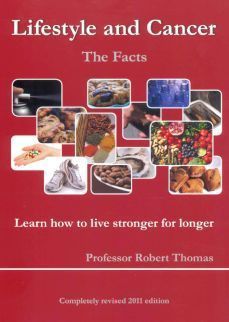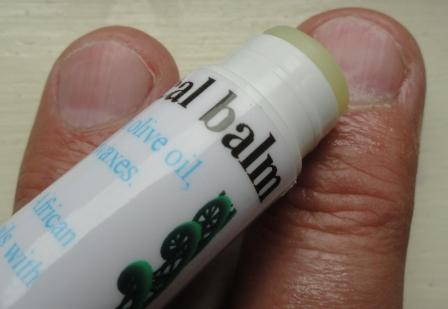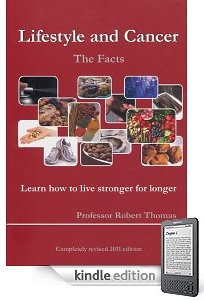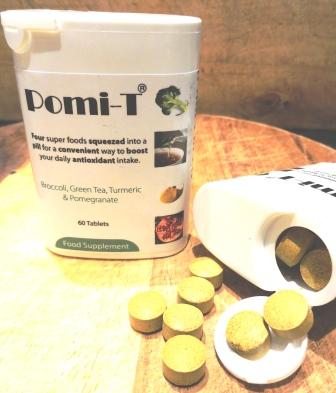|
Lifestyle
and Cancer |
|
 |
|
Lifestyle
and Cancer |
|
 |
|
July 2011 |
||||||||||||
| Welcome to
our Summer newsletter
As well as performing our own studies, we screen the world literature for recent studies which show how lifestyle can reduce the risk of cancer, improve well-being during and after treatments and reduce the risk of relapse. Please feel free to contact us: To make a suggestion for a feature, news item or announcement for our next newsletter or if you know someone who would benefit from this evidence based research news please feel free to forward it to them by entering their email below (emails never given to third parties):- Previous newsletters: Spring 2011 | Winter 2010 |
Contents of this issue
|
|||||||||||
 |
| An inspiring new book, based only on facts. Read how lifestyle helps your chances of living longer and stronger more / order online/ |
 |
| Read foreword by Paula Radcliffe |
Lifestyle research in the news
Processed Meat
Intake and higher Colorectal Cancer
Risk.  There
is further convincing evidence that eating too
much red meat and processed meat raises colorectal cancer risk and that
consuming plenty of fiber in the form of plant-based foods reduces that
risk. The Continuous Update Project (CUP), produced by the World Cancer
Research Fund and American Institute for Cancer, gathers research about
"various forms of cancer, updating its database every few years." For
this report, scientists "conducted a review of published studies and ended
up adding 263 new papers about colorectal cancer to the 749 that had been
analyzed for the last report, issued in 2007." The report notes that
"red meat, processed meat, excess body fat, and fat carried around the
waist increase risk of colorectal cancer.
There
is further convincing evidence that eating too
much red meat and processed meat raises colorectal cancer risk and that
consuming plenty of fiber in the form of plant-based foods reduces that
risk. The Continuous Update Project (CUP), produced by the World Cancer
Research Fund and American Institute for Cancer, gathers research about
"various forms of cancer, updating its database every few years." For
this report, scientists "conducted a review of published studies and ended
up adding 263 new papers about colorectal cancer to the 749 that had been
analyzed for the last report, issued in 2007." The report notes that
"red meat, processed meat, excess body fat, and fat carried around the
waist increase risk of colorectal cancer.
Talc-Based Powder Use May Increase Ovarian Cancer Risk By 30%.
 The regular use of talc-based powder
significantly increases the risk of invasive ovarian, according to
findings presented at the American Association for Cancer Research. The
researchers analysed data from a case-control study involving more than
2,000 women with ovarian cancer and a similar number of women without the
cancer. Talc applications were estimated from "patient-reported
frequency and duration of use." After taking into account the other risk
factors for ovarian cancer including age, parity,
oral contraceptive use, tubal ligation, body weight smoking or alcohol use, and
ethnic/racial or familial breast or ovarian cancer history, the study team
performed analyses for cases of cancer talc use was
associated with an increased prevalence of all common types of ovarian cancer
(nonmuscinous-invasive, nonserous-invasive, and
serous-invasive); the magnitude
of the difference between users and nonusers ranged between 20% and 40%, most
often about 30%.
The regular use of talc-based powder
significantly increases the risk of invasive ovarian, according to
findings presented at the American Association for Cancer Research. The
researchers analysed data from a case-control study involving more than
2,000 women with ovarian cancer and a similar number of women without the
cancer. Talc applications were estimated from "patient-reported
frequency and duration of use." After taking into account the other risk
factors for ovarian cancer including age, parity,
oral contraceptive use, tubal ligation, body weight smoking or alcohol use, and
ethnic/racial or familial breast or ovarian cancer history, the study team
performed analyses for cases of cancer talc use was
associated with an increased prevalence of all common types of ovarian cancer
(nonmuscinous-invasive, nonserous-invasive, and
serous-invasive); the magnitude
of the difference between users and nonusers ranged between 20% and 40%, most
often about 30%.
Large published Analysis Finds No Evidence Linking Selenium With Cancer Prevention
 It
is known from large environmental and some observational
studies that long term selenium deficiency can lead to an increase risk of
cancer. This is most likely due to an under performing antioxidant enzyme (glutathione)
which requires selenium. Some nutritional supplement companies therefore market the
mineral selenium as a cancer preventive, and there have been suggesting high selenium intake could reduce cancer
risk.
However, a comprehensive analysis of 55 studies found no evidence to supported
supplementation with selenium and a link with different cancer types. This was
published in the Cochrane Library so is regarded as a highly relevant piece of
scientific work.
It
is known from large environmental and some observational
studies that long term selenium deficiency can lead to an increase risk of
cancer. This is most likely due to an under performing antioxidant enzyme (glutathione)
which requires selenium. Some nutritional supplement companies therefore market the
mineral selenium as a cancer preventive, and there have been suggesting high selenium intake could reduce cancer
risk.
However, a comprehensive analysis of 55 studies found no evidence to supported
supplementation with selenium and a link with different cancer types. This was
published in the Cochrane Library so is regarded as a highly relevant piece of
scientific work.
The problem with taking over the counter mineral supplements is
that the baseline levels are not known so if you have a normal or higher
level to start with, taking extra mineral can push the blood levels too high
which actually increases the risk of cancer. This study further confirms that supplements can be both good and bad and
the most reliable way to to ensure you have the most benefit from them is to measure
your baseline micro-nutrient levels first.
Exercise reduces side effects of radiotherapy.
 The
worlds first study linking an association between radiotherapy side effects and
exercise levels was completed in June this year. The study sponsored by Macmillan Cancer
support evaluated 440 men who had survived prostate cancer and had been successfully
treated by radiotherapy between 2000-2010 at Addenbrooke's Hospital, Cambridge University.
The data was analysied at The Primrose Lifestyle Research Unit and the bio-statistical department at
Cranfield University. It clearly showed that men who were active as measured by
the Practitioner Physical Activity Questionnaire (GPPAQ) were twice as
likely to maintain erectile function.
The
worlds first study linking an association between radiotherapy side effects and
exercise levels was completed in June this year. The study sponsored by Macmillan Cancer
support evaluated 440 men who had survived prostate cancer and had been successfully
treated by radiotherapy between 2000-2010 at Addenbrooke's Hospital, Cambridge University.
The data was analysied at The Primrose Lifestyle Research Unit and the bio-statistical department at
Cranfield University. It clearly showed that men who were active as measured by
the Practitioner Physical Activity Questionnaire (GPPAQ) were twice as
likely to maintain erectile function.
Full data is being presented at the NCRI conference this Autumn. In the mean
time, it is strongly advisable to encourage men to exercise after prostate
cancer - read practical tips to improve exercise
levels
Walking fast but not strolling after prostate cancer reduces
the risk of relapse.
 According to a study
published in Cancer Research, men who have been treated for prostate cancer who power walk for at least
three hours a week can halve how much their cancer will grow and spread over the
next couple of years. Strolling,
however, does not have the same effect, the study authors cautioned. The researchers followed "1,455 men who had
been diagnosed with early-stage prostate cancer. The results showed that
survivors who walk briskly "at a pace of at least three miles per hour for
three hours or more per week were 57% less likely to develop the biochemical
markers of cancer recurrence or to need a second round of treatment for their
disease.
According to a study
published in Cancer Research, men who have been treated for prostate cancer who power walk for at least
three hours a week can halve how much their cancer will grow and spread over the
next couple of years. Strolling,
however, does not have the same effect, the study authors cautioned. The researchers followed "1,455 men who had
been diagnosed with early-stage prostate cancer. The results showed that
survivors who walk briskly "at a pace of at least three miles per hour for
three hours or more per week were 57% less likely to develop the biochemical
markers of cancer recurrence or to need a second round of treatment for their
disease.
This study supports the finding of another study published by Kenfield in the Journal of Clinical Oncology which showed that men who exercised vigorously for more than 3 hours a week had a lower relapse rate and those more than 5 hours a better prostate cancer specific survival - read practical tips to improve exercise levels
Vitamin A&E with mineral supplement increase the risk of skin cancer
 It has long been known that vitamin and mineral deficiencies can reduce
immunity and ability to deal with environmental carcinogens. This leads to an
increased risk of cancer.
These studies suggest that if an individual in the west takes a vitamin and
mineral supplement it could reduce the risk of cancer. A study from France,
however, compared supplementation with Vitamin A, C & E with
selenium and zinc against placebo. After 7.5 years the incidence of skin cancers
including melanoma were actually higher in the supplementation group.
It has long been known that vitamin and mineral deficiencies can reduce
immunity and ability to deal with environmental carcinogens. This leads to an
increased risk of cancer.
These studies suggest that if an individual in the west takes a vitamin and
mineral supplement it could reduce the risk of cancer. A study from France,
however, compared supplementation with Vitamin A, C & E with
selenium and zinc against placebo. After 7.5 years the incidence of skin cancers
including melanoma were actually higher in the supplementation group.
Fortunately a study published in the EJC (2010, 46, 3316-3322) showed
that stopping the supplements reduced the risk in the normal levels within 5
years. The fundamental design problem of this and other similar trials is that they did not measure baseline levels of
these vitamins and mineral before the start. So although some people may benefit
others, with a normal level to start with would end you taking them in excess.
This study again further confirms the importance of measuring your micro-nutrient levels before
considering supplements - see micronutrient
testing
Acupuncture May Relieve Hot Flashes Associated With Prostate Cancer Treatment.
 A
recent small study suggests that the ancient Chinese discipline of acupuncture might help
reduce the hot flushes that frequently affect prostate cancer patients while they're on
hormone therapy. This finding supports a recent trial involving menopausal
women comparing the incidence of hot flushes against the anti-depressant
venlaflexane.
A
recent small study suggests that the ancient Chinese discipline of acupuncture might help
reduce the hot flushes that frequently affect prostate cancer patients while they're on
hormone therapy. This finding supports a recent trial involving menopausal
women comparing the incidence of hot flushes against the anti-depressant
venlaflexane.
This latest study involved only 14 men so the finding has to be
taken with caution. In fact the oncology centres where the trial was
conducted (New
York Methodist Hospital and Weill Cornell Medical College of Cornell
University) understate the finding saying they are non-conclusive but add "our study shows that physicians and patients have an
additional treatment for something that affects many men undergoing prostate
cancer treatment and actually has long-term benefits, as opposed to more side
effects. ..Read tips on coping with hot flushes
Pomegranate Extract May Slow Prostate Cancer Progression.
 Taking a pomegranate pill a day may help slow
the progression of prostate cancer according to preliminary research
presented at the American Society of Clinical Oncology Genitourinary Cancer
Symposium Meeting. The study involved 92 men with cancer that had not
spread beyond the prostate. All men had rising prostate-specific antigen (PSA)
levels before they started taking the pomegranate extract At baseline, the men's PSA levels were
doubling on average every 12
months. The researchers found that for the men in the group taking
pomegranate capsules for at least six months, their PSA doubling time extended
to 19 months. The researchers attributed the anticancer effect
to antioxidants in pomegranates. There
were some side effects in men who took three of the one-gram
pomegranate extract capsules daily. Fourteen percent suffered mild to
moderate diarrhea compared to those who only took one pill. The design of this
study was very similar to one involving 113 men published
from Bedford and Addenbrooke's Hospitals 3 years ago which showed that 40% had a
prolongation of doubling time following lifestyle and dietary maneuvers.
Taking a pomegranate pill a day may help slow
the progression of prostate cancer according to preliminary research
presented at the American Society of Clinical Oncology Genitourinary Cancer
Symposium Meeting. The study involved 92 men with cancer that had not
spread beyond the prostate. All men had rising prostate-specific antigen (PSA)
levels before they started taking the pomegranate extract At baseline, the men's PSA levels were
doubling on average every 12
months. The researchers found that for the men in the group taking
pomegranate capsules for at least six months, their PSA doubling time extended
to 19 months. The researchers attributed the anticancer effect
to antioxidants in pomegranates. There
were some side effects in men who took three of the one-gram
pomegranate extract capsules daily. Fourteen percent suffered mild to
moderate diarrhea compared to those who only took one pill. The design of this
study was very similar to one involving 113 men published
from Bedford and Addenbrooke's Hospitals 3 years ago which showed that 40% had a
prolongation of doubling time following lifestyle and dietary maneuvers.
Requests for blood vitamin and nutrient analyses sky rocket in the USA
 Health
trend articles are reporting that testing for essential micro-nutrient, once uncommon,
has skyrocketed since medical studies linked
deficiencies and excesses to a variety of diseases,
including cancer. Our last
newsletter reported one of the many articles related to cancer especially
benefits after melanoma. The trends in the USA reveal that Vitamin D requests
are particularly sort after. The increased in requests started between 2006 and 2008,
but have increased by 74 percent by 2010. Manufacturers of vitamin D diagnostic tests
have seen similar increases in demand. Despite
the evidence, showing the harm associated with Vitamin D deficiency GP's and
hospital doctors in the UK have not been allocated funds for these test.
Fortunately, cancernet now offer an online
service
Health
trend articles are reporting that testing for essential micro-nutrient, once uncommon,
has skyrocketed since medical studies linked
deficiencies and excesses to a variety of diseases,
including cancer. Our last
newsletter reported one of the many articles related to cancer especially
benefits after melanoma. The trends in the USA reveal that Vitamin D requests
are particularly sort after. The increased in requests started between 2006 and 2008,
but have increased by 74 percent by 2010. Manufacturers of vitamin D diagnostic tests
have seen similar increases in demand. Despite
the evidence, showing the harm associated with Vitamin D deficiency GP's and
hospital doctors in the UK have not been allocated funds for these test.
Fortunately, cancernet now offer an online
service
 Cancernet
and The Primrose Cancer Unit launch joint "Nail Care Guidelines".
Cancernet
and The Primrose Cancer Unit launch joint "Nail Care Guidelines".
Following a study conducted at the Primrose Oncology Unit published in the Journal Focus on Cancer Medicine joint guidelines have written by the medical information team. As well as information learnt in this study (see below) the guidance was based on a search of the world literature advice from dermatologist and above all tips from patients who have gone through chemotherapy and experienced discomfort, disfigurement and even loss of their nails. As well as good hygiene the main advice is moisturizing the nail beds with a natural oil based cream and cooling the nails during chemotherapy ..read full guidelines
 Cancernet driving down the cost of "Making a
Will or
Living Will".
Cancernet driving down the cost of "Making a
Will or
Living Will".
As part of a drive to reduce the financial burden of cancer and the
effect of its treatments cancernet has
teamed up with a leading UK lawyer to drive down the cost of making a
solicitor reviewed Will. They have developed a reliable, easy to use,
online resource which ensures your assets (money, property, jewellery, etc)
go to the person you want and not those you least want such as the
taxman. Cancernet-glossLegal Wills start from £39 and living
Wills for only £15 ... read
more
Lifestyle and Cancer - the facts is now available on Amazon Kindle
 Following the success of the first edition a completely
revised second edition has been launched in 2011. The fully colour illustrated
book is still available to order online but now it has also
been reformatted for the benefit of Kindle
users.
Following the success of the first edition a completely
revised second edition has been launched in 2011. The fully colour illustrated
book is still available to order online but now it has also
been reformatted for the benefit of Kindle
users.
This second, 2011, edition has been extensively re-written with evidence from the latest high quality research from around the world which has demonstrated how diet, exercise and other lifestyle changes can; help avoid cancer especially if you have a family history or genetic risk; help you cope with treatments side effects; reduce the risks of complications of cancer treatments; slow the rate of progression of cancer and help prevent your cancer relapsing. What some of the 5000 readers of the first edition have said:
 "This book has been fundamental in providing
well needed support; arming my mother with the tools to win her own personal marathon" Paula
Radcliffe.
"This book has been fundamental in providing
well needed support; arming my mother with the tools to win her own personal marathon" Paula
Radcliffe.
"This book stands out from the crowd - it sorts out the wheat from the Chaff. My lifestyle bible, it helped me to recover earlier with more confidence" Cecilia Nicholson Journalist and Survivor.
The world's first randomised evaluation of a broad spectrum antioxidant rich super food under design.
 A
randomised trial is about to be launched involving men with prostate
cancer. It will measure PSA progression after intake of a mix of
concentrated super foods or
placebo. The antioxidant rich supplement was designed by the research team
following an extensive search of the world literature. Despite all the publicity
being around tomatoes, the strongest evidence was actually for turmeric,
pomegranate, green tea and broccoli.
A
randomised trial is about to be launched involving men with prostate
cancer. It will measure PSA progression after intake of a mix of
concentrated super foods or
placebo. The antioxidant rich supplement was designed by the research team
following an extensive search of the world literature. Despite all the publicity
being around tomatoes, the strongest evidence was actually for turmeric,
pomegranate, green tea and broccoli.
These super foods have a high antioxidant
content which is not damaged by the during process in order to concentrate them
into a tablet form. By combining four different food sources it is
hoped that their anti-cancer properties are enhanced whilst avoiding excesses
within each category of anti-oxidant. The study will involves 150 men and is due
to start at The Primrose Unit in the Summer of 2011, pending ethical approval. -
read full protocol
Email the trials unit to find out more about the clinical trial and to see if you may be eligible
Guest article of the issue
Looking after you nails during chemotherapy
Clinical focus on Cancer Medicine 2010 2(1): 18-19. (full illustrated paper)A COOL SOLUTION FOR DOCETAXEL INDUCED ONYCHOLYSIS by Ni Ding and Robert Thomas
 Introduction
Docetaxel belongs to the taxane group of
chemotherapy agents. One of the commonest side effect that
affects as high as 44% of patients on
taxane is nail changes which may include discolouration, brittle nail, acute
paronychia and onycholysis.
Introduction
Docetaxel belongs to the taxane group of
chemotherapy agents. One of the commonest side effect that
affects as high as 44% of patients on
taxane is nail changes which may include discolouration, brittle nail, acute
paronychia and onycholysis.
Results. Mrs S complained of marked discomfort in the right hand but not the left hand or her feet following cycle two and for six weeks after her fourth cycle (see photograph)
. Furthermore, she developed onycholysis in her right finger nails but not the nails of the left hand. A photo was taken 4 weeks after the end of the fourth cycle of Docetaxel administration which clearly showed onycholysis in the right hand but not left.
Conclusion The nails of this patient were protected by immersion in ice cooled water during the administration of Docetaxel. This report suggests that immersing hands and feet in cold water is a practical way to reduce the incidence of Docetaxel induced nail toxicity. Future randomised analysis could focus on the feasibility of introducing this cooling method into routine practice, particular the magnitude of benefit, optimal duration and temperature of cooling required. ... Read full illustrated paper
Anti-oxidant focus - the benefits of green tea
 It
may surprise some people that both green tea and the black stuff we’ve been
drinking for several hundred years come from the same plant, Camelia Sinensis, found in tropical and sub-tropical regions like India and China. When
dried, black tea is fermented and oxidised. Green tea is left unfermented, and
then merely steamed. Many experts now believe that green tea is thus a better,
more whole, source of natural chemicals like proteins, sugars and vitamins and,
in particular, natural polyphenols and antioxidants.
It
may surprise some people that both green tea and the black stuff we’ve been
drinking for several hundred years come from the same plant, Camelia Sinensis, found in tropical and sub-tropical regions like India and China. When
dried, black tea is fermented and oxidised. Green tea is left unfermented, and
then merely steamed. Many experts now believe that green tea is thus a better,
more whole, source of natural chemicals like proteins, sugars and vitamins and,
in particular, natural polyphenols and antioxidants.
The polyphenols in green tea are potent antioxidants and have also been shown to protect against heart disease, as they can prevent the oxidation of LDL into cholesterol.
Researchers
from the University of Pennsylvania and Boston Biomedical Institute have also
shown that EGCG helps protect the brain from the build up of amyloid proteins.
They concluded that Green Tea would help prevent Parkinson´s and Alzheimer’s,
and could also be used in treatment. Other 2009 researches from the American
College of Nutrition found that regular Green Tea consumption could prevent
colds and flu. The study compared people taking a green tea supplement with
those taking a placebo and showed one third less colds and flu in the green tea
supplement group. Green tea is also alleged to improve skin tone, smooth out
wrinkles and even to help you slim. EGCG is also known to cause good bacteria in
the intestine to flourish, thus aiding recovery after antibiotics or
chemotherapy.
 Recipe of the issue Recipe of the issue
Super food breakfast mix
Ingredients
Instructions
Add a heaped tablespoon to your breakfast cereals or porridge every morning alot with some fruit such as blackberries bananas or apples. Not only a great tasting start to the day but packed with essential omega 3 and 6 oils, antioxidants and roughage. As the oil and fibre is mixed and not wheat based it produces a soft regular stool without any bloating. In you still get constipated after this try taking two tablespoons plus other measures for constipation.
|
 Poem
of the issue Poem
of the issue
The Grainne I hear a sound within me The doctors look at me I go for an examination I have a life that I want Treatment is so worrying When this is all over For I will not look for bounderies
|
|
Advertisements and resources
|
This
test measures the body's essential micro nutrients levels, deficiencies
or excesses of which have been linked to cancer. The detailed report
advises foods and supplements to avoid, or eat more of, relevant to your
specific results:
To
order: 1.
Click on Cancernet.co.uk/nutritional-tests.htm 2.
Securely pay online 3.
A blood sample kit will be sent to you 4.
Have a blood test and send the pack back to the
lab 5.
The results
and a detailed report will be sent to you from
a consultant oncologist who specialises in lifestyle and cancer
research. 6.
Empower your dietary choices and
restore nutritional balance! |
||
Cracked
and chapped lips are uncomfortably and unsightly. This distressing
symptom is common following exposure to sun, wind, after a period of
stress or dehydration. Recent research has also shown this to be worse during chemotherapy
and individuals with chapped lips were more likely to get cold sores.
The same research also showed that that natural oil based creams were
reported to be better than petroleum based
creams (see full paper).
Nature-medical
lip balm
contains only 100% pure organic olive oil, beeswax, cocoa and shea
butter. These have been naturally medicated with rare essential oils
including African sage, lavender, eucalyptus and wintergreen selected
for their antioxidant, anti-inflammatory and DNA stabalising properties including essential oils
for their
anti-inflammatory and anti-septic properties.
It is also idea for moisturizing and soothing the nail beds to prevent and
treat cracked skin around the cuticles. |
||
 Lifestyle
after Cancer - the facts Lifestyle
after Cancer - the facts
Following the sell-out first edition this book has been extensively re-written with even more evidence from two more years of international research and feedback from readers from over 5000 sales of the first edition. It is up-to-date, topical and relevant to the stresses of modern day life - You now can be even more confident the book explains the reasons why foods, personal habits and environmental factors can increase or decrease the risks of cancer and other major illnesses and help you recover stronger from cancer treatments. Available on amazon kindle (£7.99) or you can order the book securely online by credit card or paypal (£8.95+pp)
|
||
 Chemotherapy
and radiotherapy
- An award winning
20 minutes preparatory DVD Chemotherapy
and radiotherapy
- An award winning
20 minutes preparatory DVD
Patients who had completed a course of treatment have teamed up with the medical profession and TV personalities to produce this 20 minute program. Sue Lawley introduces the film and Anton Rodgers explains the details of chemotherapy and radiotherapy while watching patients actually going through the various stages of treatment. The sections on radiotherapy or chemotherapy both are clearly demarcated within which patients describe their own experiences, side effects and methods to alleviate them. This is the only cancer information film which has been scientifically evaluated and is now widely used in the UK, Australia and Italy.. read the scientific randomised trail of its evaluation published in the European Journal of Caner: (Forewarned is forearmed – benefits of preparatory information on video cassette for patients receiving chemotherapy and radiotherapy- a randomised trial. EJC 36 (2000) 1536-1543). A DVD can be bought online and sent to you by direct post - £5.50: |